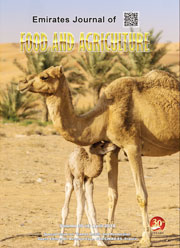Starch accumulation in duckweeds (lemnaceae) induced by nutrient deficiency
DOI:
https://doi.org/10.9755/ejfa.2022.v34.i3.2846Abstract
The aim of the present project is to demonstrate the potential of duckweeds in fast production of starch-rich biomass that could render
these plants as promising next generation crop plants. Starch-rich biomass can be produced by several methods of starch induction. In
the present project the effects of nutrient deficiency (phosphate, nitrate and sulphate) on starch accumulation were investigated in 21
clones (strains) of duckweeds covering 11 species and all 5 genera of the duckweed family encompassing a wide geographic area. The
magnitude of change in the starch content after treatment with nutrient deficient medium varied widely within the genera, the different
species and different clones of the same species. Highest values, between 40 and 50 %, of starch on dry weight basis of the whole
plant biomass were obtained after two weeks of application of phosphate- or nitrogen-lacking nutrient media whereas sulphate deficiency
showed minor effects. It is concluded that various clones of the species Landoltia punctata, Lemna minor, and Spirodela intermedia proved
to be promising candidates for starch rich biomass production.










 .
. 